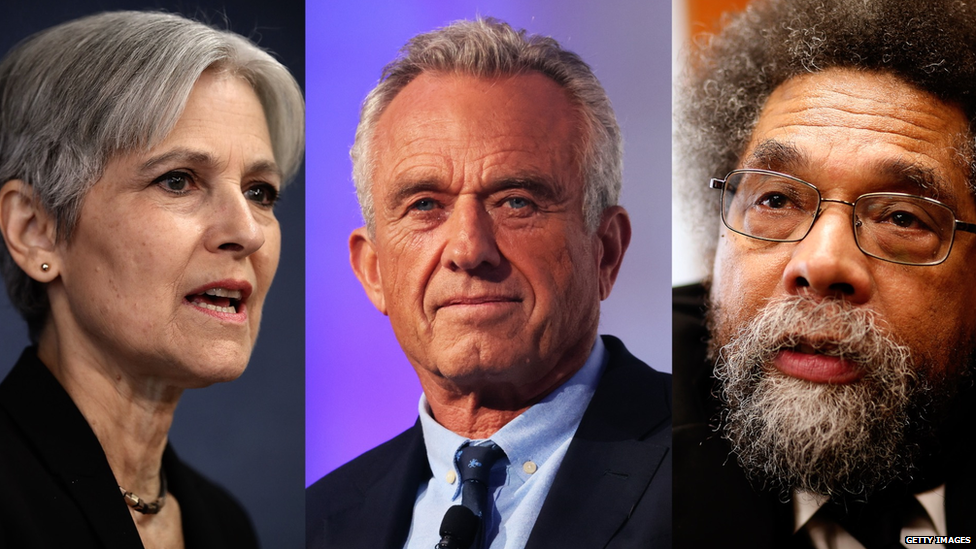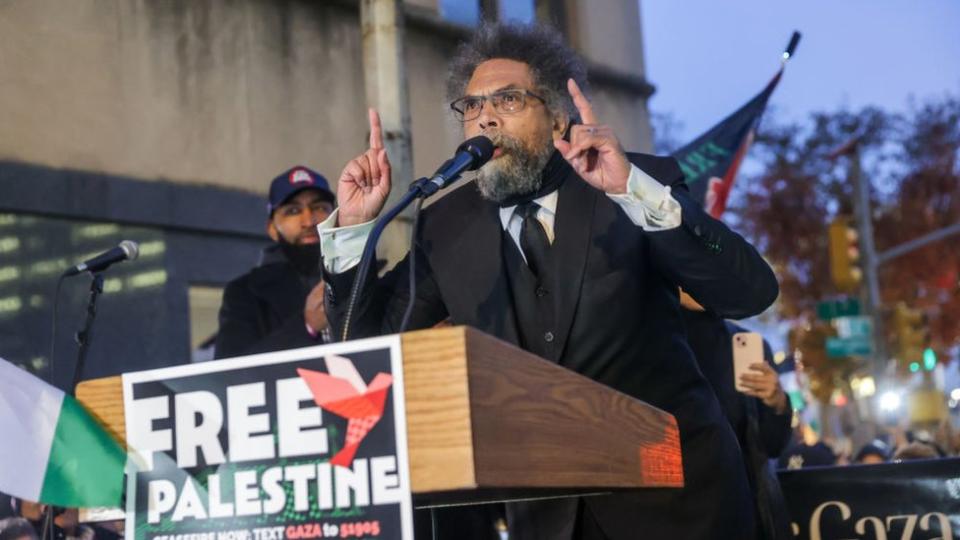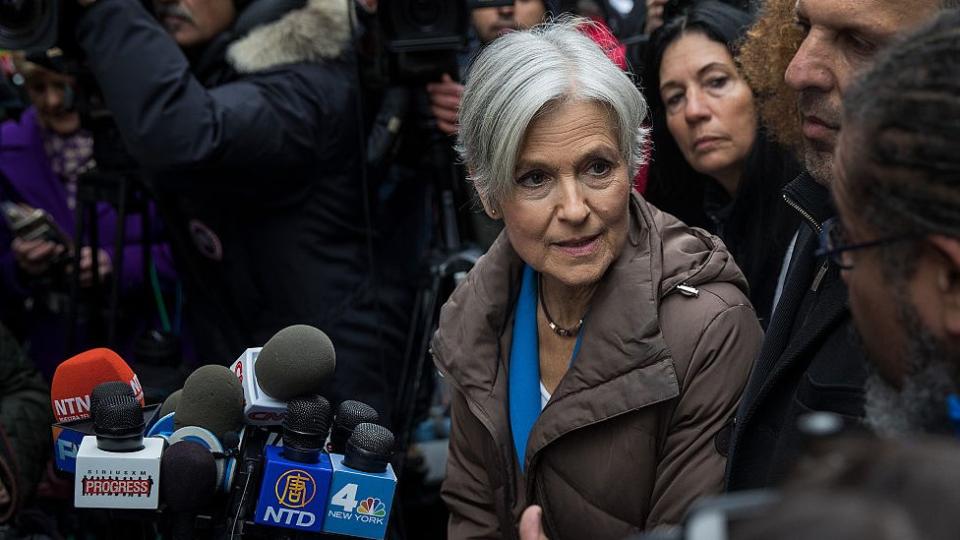US election 2024: Who are the longshot candidates who could swing the vote?

- Oops!Something went wrong.Please try again later.
- Oops!Something went wrong.Please try again later.
- Oops!Something went wrong.Please try again later.
Joe Biden and Donald Trump will be the major party candidates, but dozens of other people have filed paperwork to run for president of the United States in 2024.
None are considered serious contenders for the White House.
But the most well-known among them - including those who have the support of third parties - have the potential to siphon off support from the two big names.
Here are the candidates with the greatest potential to disrupt the race.
Robert F Kennedy Jr
As a nephew of former president John F Kennedy Jr, the 69-year-old is a scion of America's most famous political dynasty and an anti-vaccine activist.
Mr Kennedy, a former environmental lawyer, entered the presidential race as a Democrat earlier this year. That changed in October when he declared he would challenge what he called the "two-headed monster" of the US political system as an independent.
"The Democrats are frightened that I'm going to spoil the election for President Biden. The Republicans are frightened that I'm going to spoil it for President Trump," he said at a rally in Philadelphia.
"The truth is, they're both right."
On the campaign trail, Mr Kennedy has come under intense criticism for repeating debunked conspiracy theories, such as a connection between childhood vaccines and autism.
He has also repeatedly condemned steps taken to mitigate Covid-19, in one instance likening vaccine mandates to Nazi Germany. He later apologised.

While he stands little chance of winning the presidency, Mr Kennedy's populist economic message has swayed many voters.
In most surveys which include Mr Kennedy as one of the options, he has polled third behind the two major candidates, but there are varying views as to whether he might siphon off more support from Mr Biden or Mr Trump.
In March, he chose Silicon Valley lawyer and philanthropist Nicole Shanahan, another newcomer to presidential politics, as his running mate. She was previously a longtime Democratic donor and bankrolled Mr Kennedy's Super Bowl ad.
One major hurdle Mr Kennedy faces as an independent candidate is getting on the ballot. The rules for ballot access vary widely from state to state, and candidates without party backing face a difficult and expensive task involving collecting thousands of signatures.
Mr Kennedy has enough signatures so far to qualify for the ballot in half a dozen states, his campaign says.
Cornel West
A well-known and outspoken progressive activist and academic, 70-year-old Mr West is currently a professor of philosophy at Union Theological Seminary in New York City. He previously taught at Yale, Princeton and Harvard.
Mr West launched his presidential bid in June as a candidate for the People's Party, a self-described progressive group created by people who once worked for Bernie Sanders, one of only three independents in the US Senate.

In a campaign video posted online, he vowed to run "for truth and justice" and criticised both parties for not "telling the truth".
Soon after, Mr West said that he would seek a nomination from the Green Party.
But he again reversed course and in October announced that he would run as an independent candidate. His campaign has largely focused on a socialist platform that has included public healthcare and slashing the US defence budget.
He has selected Melina Abdullah, an academic and member of the board of directors of the Black Lives Matter Grassroots organisation as his vice presidential nominee.
While Mr West has largely been ignored by the other candidates and most polls show him having support in the single digits, some data has suggested that his candidacy has siphoned off some voters - 1 or 2% - from Mr Biden.
As an independent, he faces the same uphill battle to obtain ballot access - but with much less money than the Kennedy campaign.
More on the US election
Explained: A simple guide to the US 2024 election
Analysis: Where Biden v Trump will be won and lost
Predictions: Four surprises that could upend the election
Policies: What a Trump second term would look like
Voters: 'It's like 2020 all over again - with higher stakes'
Jill Stein
The 73-year-old activist and physician has announced that she would run for office and again seek the Green Party's nomination. She ran as the party's candidate in 2012 and 2016 and is the clear party frontrunner this year.
Ms Stein launched her candidacy in a video attacking both political parties as posing a "danger to our democracy".

"Democrats have betrayed their promises for working people, youth and climate again and again," she said. "Republicans don't even make such promises in the first place."
In the video, Ms Stein also called for an "economic bill of rights" that would include universal access to healthcare and education and a right to employment. She also vowed to fight climate change and to defend abortion access for women and the transgender community.
It is unclear how much support she could siphon off from Mr Biden - but she has arguably been a spoiler in the past.
In the 2016 presidential election, 1.6 million Americans voted for her. Some Democrats blamed her for taking support from Hillary Clinton in key battleground states and ultimately helping Mr Trump win.
In three of these states - Pennsylvania, Michigan and Wisconsin - Mrs Clinton lost to Mr Trump by fewer votes than Ms Stein received.
The Green Party, whose nominee will be confirmed at a convention in July, is on the ballot in at least 20 states, according to its official website.
Libertarian Party
The Libertarian Party advocates for small government and has tended to pull more support from the right of the political spectrum - which would tend to hurt Mr Trump.
Although the party tends to get a fraction of media attention that the major parties attract, they have an established grassroots organisation and wide ballot access.
In 2020, candidate Jo Jorgensen got more than 1.8 million votes.
That is slightly more than 1% of all ballots cast, but Ms Jorgensen garnered more votes than Mr Biden's margin of victory in three close states: Wisconsin, Arizona and Georgia.
This year's Libertarian Party nomination contest is wide open. Five different candidates have won state primaries, and the party will settle on its candidate at a convention in late May.
Liz Cheney
Former Wyoming congresswoman Liz Cheney became a pariah in the Republican party after she voted to impeach Trump for the US Capitol riot of January 2021.
The daughter of former Vice-President Dick Cheney served on the Democratic-appointed committee to investigate the riot, putting her in a position to speak out frequently against Mr Trump and his supporters.
Her ouster from Congress by voters has opened up the possibility that she may join the third-party candidates vowing to take on both Mr Trump and Mr Biden.
Although not officially declared as a candidate, she told US media in early December that she was willing to do "whatever it takes" to block Mr Trump from the White House and has hinted that she might consider running.
One possible route to a candidacy was the No Labels organisation, a collection of current and former centrists from both parties which floated the idea of running a presidential contender.
However, No Labels later said it had determined it could not find a candidate with a "credible path" to the White House, and will not be nominating in 2024.

